
James O'Brien 10am - 1pm
1 February 2023, 12:34 | Updated: 1 February 2023, 22:22
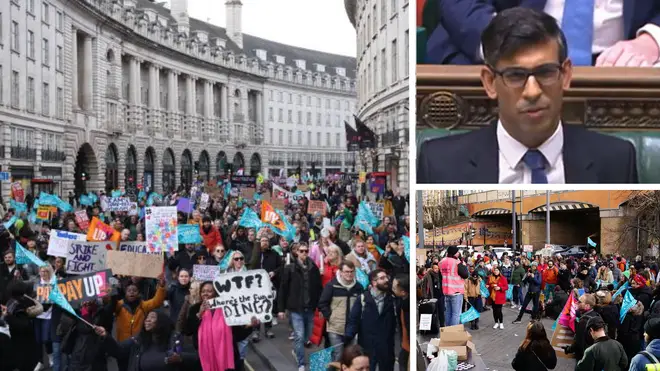
Prime Minister Rishi Sunak has said children deserve to be in school after teachers brought London to a standstill on Wednesday.
Striking teachers descended on central London, as the city ground to a halt on 'Walkout Wednesday' with workers in several industries walking out on the same day.
When asked whether he would negotiate with working people during PMQs, Mr Sunak said teachers had been given "the highest pay rise in 30 years", which also included a 9% raise for newly-qualified teachers.
"I am clear that our children's education is precious and they deserve to be in school, being taught," he said.
"And actually the party opposite [Labour] would do well to say that strikes are wrong and we should be backing our school children."
The National Education Union (NEU) estimated some 85% of schools would either be partially shut or completely closed. Some 23,000 schools have been affected, with tens of thousands of teachers walking out, the union said.
Figures collected by the Department for Education showed that 45.9% of schools in the UK were reported to be fully open, 44.7% were open but restricting attendance and less than 9.3% were closed completely.
This was based on returns from 77.3% of schools in England.
Education Secretary Gillian Keegan said: “I am very grateful to head teachers for all their work to keep our schools open and to minimise the impact of today's strike action.
“One school closure is too many, and it remains deeply disappointing that the NEU proceeded with this disruptive action – but many teachers, head teachers and support staff have shown that children’s education and wellbeing must always come first.
“Conversations with unions are ongoing and I will be continuing discussions around pay, workload, recruitment and retention, and more.”
Workers across seven unions are angry about pay and conditions, with past offers rejected for being below inflation - while the Government says union demands are unaffordable.
Teachers, university staff, train drivers and civil servants are part of the mass action involving 500,000 workers - the biggest strike in a decade, according to the Trade Union Congress.
The #TeacherStrike rally making its way up Regent Street pic.twitter.com/7p4I00g3Ac
— 👉🏻 𝙽𝚎𝚒𝚕 𝙼𝚎𝚊𝚍𝚜 🎧🎬 (@MusicLikeDirt) February 1, 2023
Teachers marched on Westminster to demand a pay rise and better conditions on Wednesday morning, with colleagues across the UK also on strike. Several roads were closed in central London amid the strikes.
The government said that they were "very disappointed" with the strike.
Addressing the Education Secretary at the rally on Wednesday, NEU chief Mary Bousted said: "Gillian Keegan, we are disappointed with you!

Mary Bousted of the NEU speaks to protesters
"We are very disappointed that your government has sat on its hands and done nothing, month after month...
"And I say to Gillian Keegan - look love, there are 27 days before the next strike... so rather than going to the television studios as you did this morning saying there's no more money, here's a lesson for you.
"Stop the anti-teacher rhetoric. Stop the anti-union rhetoric. Stop the gimmicks. Stop the tricks. Get into a room, sit down and negotiate."
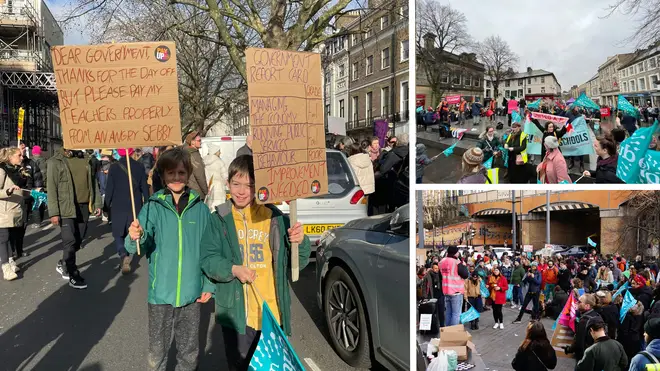
Small business minister Kevin Hollinrake told LBC that he respected workers' right to strike but that the impact of the closes roads would be tough for business owners and their employees.
"I absolutely respect people's right to strike and to make their feelings known, and I know lots of people that are going through very difficult times right now," he said.
"So you've got to be very sympathetic to anyone in that circumstance, but you've also got to be sympathetic to people who are trying to earn a living in the private sector - particularly business people and the people who work for them.
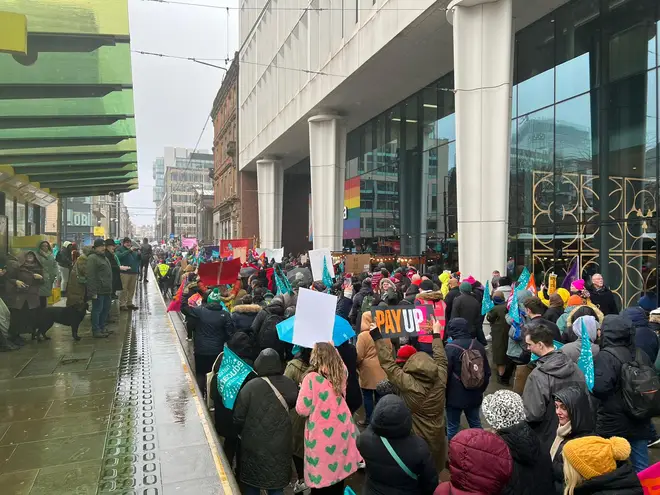
"So of course it's a concern - all I would say to people is by all means make your feelings known but do it in a way that doesn't stop other people earning a living."
Speaking on the march to Westminster on West London secondary school teacher Toby Dawson said that special needs children were among the most affected by the lack of funds in education.
"You see it when it comes to having help for kids with special education needs, the lack of people available to help out the kids who are really in need," he said.
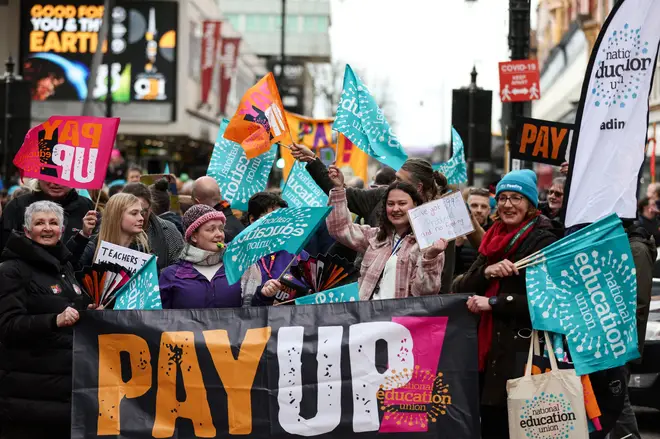
"There's no money to get more teaching assistants and LSAs (Learning Support Assistants) into schools at the moment. I would say that's probably the number one impact that's felt," he told the PA news agency.
The 28-year-old physics teacher said that he is seeing kids with special needs not get the support they need in his own school.

Care worker says there is strike frustration in private sectors because they also need a pay rise
"I have kids that come into school at the beginning of the year, and maybe a couple of times a week they might have someone with them who could help support them with their special education needs," he said.
"But really that should be every lesson, maybe in the past it would have been like that, but it's just not happening at the moment."
It comes after Education Secretary Gillian Keegan told LBC she would do “anything possible” - but “only things that make sense” to avert further strikes.

Gillian Keegan says strike action isn't a reflection of her government
“Clearly inflation-busting pay rises make no sense,” she told Nick Ferrari at Breakfast on Wednesday.
“My responsibility is to… make sure our children get a world-class education, and to do that we need to make sure we recruit the best and retain the best teachers," she added.
TUC General Secretary Paul Nowak said on Wednesday that public support for strikes will not dwindle even if the disruption forces people despite the effects on their everyday lives.

Watch again: TUC's Paul Nowak takes your calls
Answering calls from listeners on Nick Ferrari at Breakfast, Mr Nowak said that the public would continue to support the strikers even if it caused them to miss family funerals.
Teachers who are members of the the National Education Union have seven days of strikes planned including Wednesday:
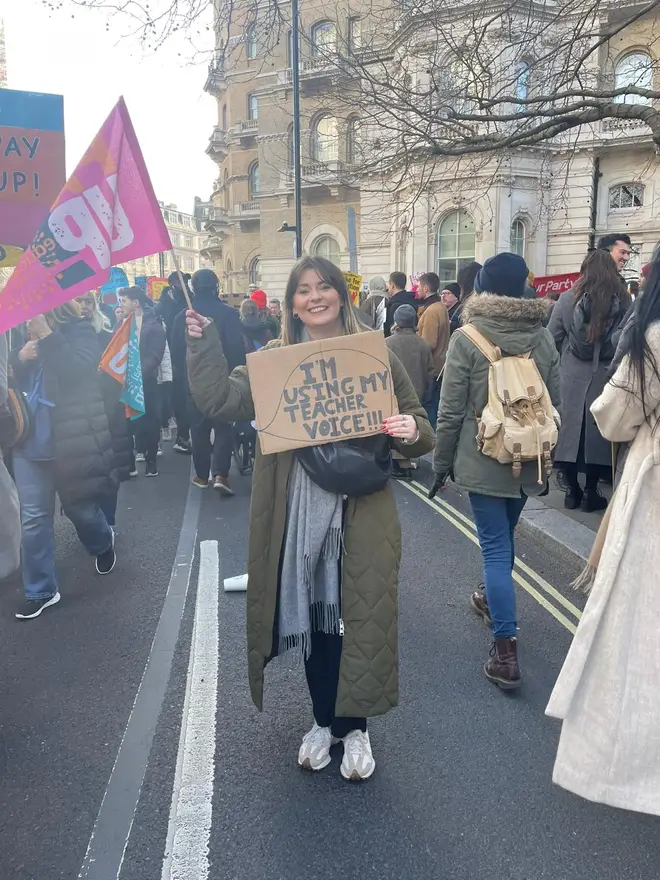
James Hibbard, a head of year at Myton School, Warwick, where National Education Union members were striking on Wednesday, believed an agreement with the government would not be forthcoming before a second strike involving members in the north of England on February 28.
He said: "I think we'll be back on the 28th. I'd like to think it will show to people there's a little bit of disruption. That's going to help people realise the struggle that we're in but don't necessarily think the Government will listen to that straight away.
"But I think they need to start thinking about the way funding streams work and how we can get a fully-funded education system."
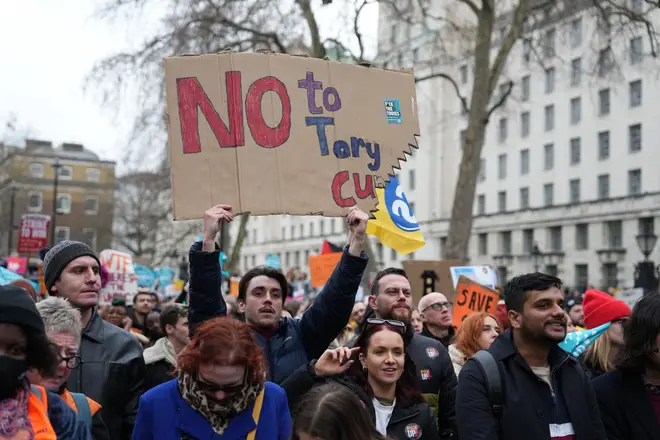
About 100,000 civil servants also walked out, including staff from the Department for Work and Pensions and the DVLA.
It came on the same day as almost no trains ran, with drivers at 14 railway companies, members of the Aslef union, striking on Wednesday.
Aslef general Secretary Mick Whelan said a deal which would bring an end to strikes is "further away than when we started" following months of failed negotiations with the Government.
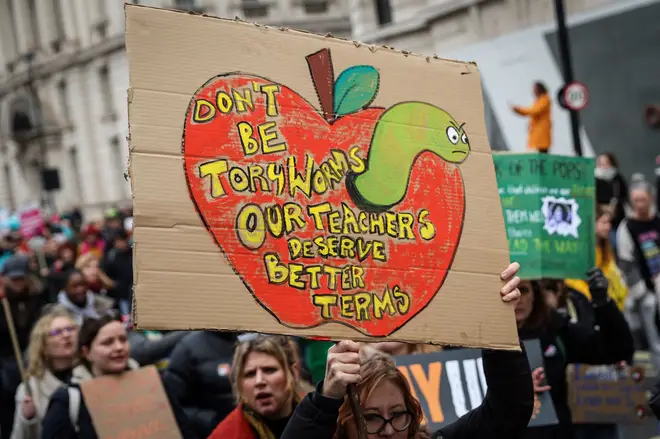
Speaking about whether Prime Minister Rishi Sunak's Cabinet has ushered in any fresh hope for negotiations following months of stagnation under previous leaders, Mr Whelan told PA: "This isn't a new Government - the same people have been in place for 12 years.
"They've had 12 years to look at the needs of the economy, the needs of workers, and they've either got to adjust what they are doing, or they are going to go into recession."
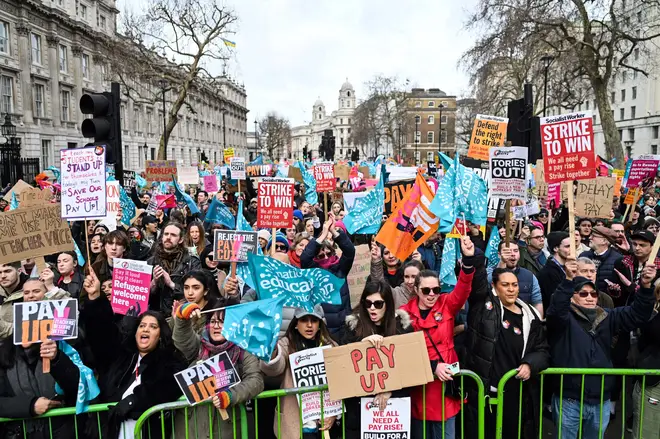
He added: "I think we're further away than when we started.
"I think the bad faith non-offer that was put out to the press, not run through negotiation teams, and that threatened us with compulsory redundancies, has exacerbated an already difficult situation."
Meanwhile universities across the UK have also been hit by walkouts, with lectures and seminars cancelled, as 70,000 staff have begun an unprecedented period of strike action over pay, working conditions and pensions.
The University and College Union (UCU) expects 2.5 million students to be affected by 18 days of strikes during February and March.